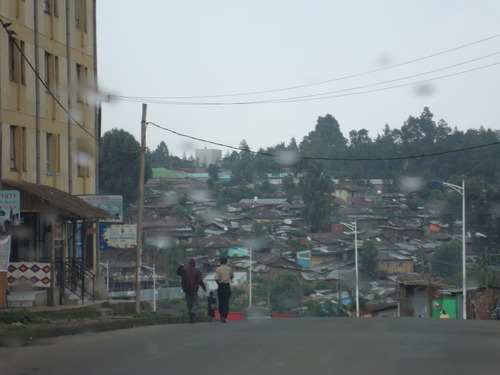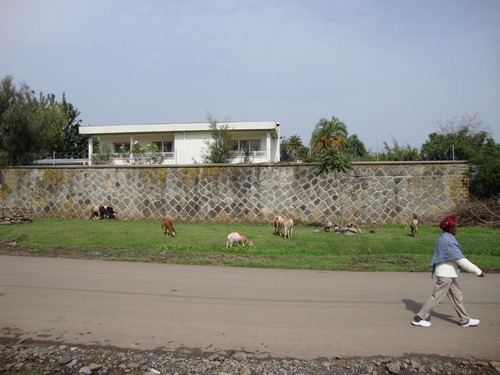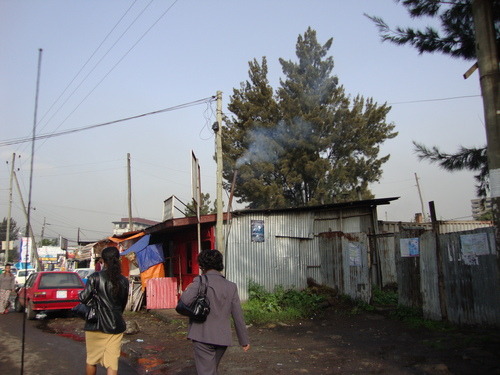Farewell to Purgatorial Eden
December 2014
The Road Less Traveled
Tales of Transition
By Kirsten Bauman
 Today is Friday. I’m moving soon and my growing to-do list is daunting. First, I have to cash a check at the bank so I can pay my household staff. There’s my indispensable nanny, the housekeeper-cook who also does the grocery shopping, the gardener who doubles as a security guard and driveway gate opener, and the driver whose sole job it is to pick my two toddlers up from their preschool every afternoon. I also have to remember to leave money for the children’s last weekly French class and organize our last Saturday with friends at the Sheraton pool resort where our family has a membership. And then there’s the goodbye party to plan.
Today is Friday. I’m moving soon and my growing to-do list is daunting. First, I have to cash a check at the bank so I can pay my household staff. There’s my indispensable nanny, the housekeeper-cook who also does the grocery shopping, the gardener who doubles as a security guard and driveway gate opener, and the driver whose sole job it is to pick my two toddlers up from their preschool every afternoon. I also have to remember to leave money for the children’s last weekly French class and organize our last Saturday with friends at the Sheraton pool resort where our family has a membership. And then there’s the goodbye party to plan.
Not bad for a mid-level U.S. government bureaucrat. But there’s a catch. I live in Africa, a place where all these luxuries are negated by the shadows cast by Ethiopia’s dark side. It is a place where deformed beggars drag their bodies through the dirt in hopes of reaching a sympathetic passerby to receive some small handout, where the blind stumble along the chaotic streets to tap on windows of cars stopped in traffic, and where emaciated mothers carrying babies with vacant eyes wander the city in a desperate search for food or money. These are the faces of extreme poverty that help form the fabric of life in the capital city of Ethiopia. And they are the other side that lives just outside my home’s walled enclosure.
My husband Brian and I had chosen Ethiopia out of a long list of possibilities. As a U.S. diplomat, I signed an oath for worldwide availability based on the needs of the service. These needs had led me to Paris, France; Washington, DC; and Athens, Greece, and it was now our turn for a hardship assignment. As we carefully prepared our bid list, we deemed Ethiopia to be the best compromise – meeting both the needs of the service and the needs of our family. So, with a deep breath, I declared myself ready for our Africa adventure. I was ready.
Or so I thought.
The problem: Having grown up in a typical American middle class household, the amenities I now have access to while living in Africa are unlike anything I could hope to acquire in the United States – clearly, I am living well. Yet sitting in the yard of my beautiful two-story Ethiopian home tended by my mini-army of household staff while browsing the latest copy of Architectural Digest under a warm December sun, watching the nearby slaughterhouse vultures soar above my house while listening to the crack of a child shepherd’s whip just outside my gate – the ruthlessness of humanity sneaks up and slaps me in the face with a frank and shocking boldness.
But I can’t think like this now. My guests will be arriving soon. After three years, I will soon be leaving this complex place of extremes, and I’ve set aside today as the day to celebrate – to say goodbye, thank you, and good luck to the Ethiopians who have touched my life.
Thinking over the day’s guest list, I stare at my house’s security gate topped with razor wire and broken glass, awaiting the arrival of my guests with mixed emotions. There’s our housekeeper Tigist and her adopted daughter; my gardener/house guard Shibru; Tesfaye the optimist who works with development charities; Mesfin, my Ethiopian colleague at the Embassy; and my driver Getahun. My mind wanders over my Ethiopian guests’ lives – their obstacles and challenges, their uncertain futures. I want to hope for the best for them, but I know better. They reside in a tough and capricious world, where everything is fleeting. Unlike me, they can’t just fly away, leaving it all behind and starting off into the next phase of life.
As I start lapsing into this all-too-familiar state of melancholy, a knock at my gate saves me from my thoughts. I paste on my best smile and walk down the length of my gravel driveway to open the massive metal gate door and greet the day’s first arrival. It’s Fasika. In an instant of seeing her there at my threshold, I know that she is wearing my same forced smile. Perhaps women the world over all own that same look – putting on the best face to mask the turmoil that lurks just below the surface.
Fasika is my children’s nanny and my rock, the person I’ve relied on to help me adjust to life in Ethiopia. She is 29 years old and single, with no intention of giving up her independence despite the intense pressure from her family to marry.
After working as a nanny in Dubai for five years to escape her father’s demands that she marry, Fasika eventually missed home so much that she returned. And that’s when she came into our lives, helping to care for our kids, clean the house, wash the clothes, and basically run our lives. Her tireless work ethic is exemplary, with an initiative and attention to detail that sets her apart. That is, until one week when she became unusually distracted. Putting valuable potable-water ice cubes in the refrigerator and a ketchup bottle in the shower shampoo holder – something was definitely up.
“Fasika, is something wrong?” I’d asked.
“Nothing wrong.”
“It’s just that it seems like maybe you’re upset about something. I just found some books in the cupboard with the dishes.”
“I live in apartment now.”
“What?”
“My father find me husband.”
“What? Are you married?”
“No! I say no. I do not like this man.”
“And your father?”
“He is very angry. He kicks me out of his home. My whole family is very angry. They tell me to marry.”
“Why?”
“Because my father wants my baby before he dies. I am the favorite. I have the face like my daddy’s mommy. He wants to see this face on my baby.”
“But doesn’t he want to see your face happy?”
“He wants to see the baby,” is her stone-faced reply.
And two weeks later, she was married. Two months after that and she’s coming to my house for my goodbye party.
Fasika arrives at my house alone. She did not bring her husband. Using my most chipper voice, I ask how married life is treating her. Her forced smile immediately disappears as she delivers the matter-of-fact reply, “I clean his house.“ But I don’t have time to delve deeper; my other guests are arriving – each of whom has their own compelling story to tell. Tigist brings her adopted daughter, a little girl she rescued from starvation deep within Ethiopia’s interior while on an annual pilgrimage. Getahun recently almost died from appendicitis due to Ethiopia’s limited medical care. Mesfin, my Ethiopian colleague at the U.S. Embassy, is here too. It’s a relief to see him smiling – only one month ago he had been falsely accused of a crime, spending one week in a rural jail until finally managing to untangle himself from his country’s opaque and corrupt legal system.
With everyone now here, the party progresses to the sound of laughter as we fill our stomachs, enjoy each other’s company, and eventually watch the sun’s descent. As our conversation slowly winds down in the dusk hours, with all of us gathered around my outdoor bonfire as we finish the last of the food, Fasika and I tear up a little at the finality of the moment. This really is the end, and Brian, my two toddler daughters and I are actually leaving.
Brian suddenly breaks the uncomfortable silence. "Hey, why does everyone look so down? Does this mean the party’s over?”
Mesfin protests: “No way, let’s dance!" And everyone jumps up to dance in the glow of the setting sun.
As I stand in the middle of my lush garden in Ethiopia, in the twilight of today’s farewell party, I am struck by sadness as I say my goodbyes to this handful of souls who have touched my life. I look upon this group of Ethiopians – dancing in my yard to their unique rhythmic music with jerking shoulders and fast-rolling head movements – with gratitude and a certain sadness. In their insecure world, they toil without modern conveniences, they are often without electricity or running water, and they live in cramped dwellings. They are not free to choose whether or not they marry, and they may be only a step away from an untimely death from something as innocuous as appendicitis. They don’t really own their future or know what tomorrow will bring.
“Madame. You come,” Fasika and Tigist demand with mischievous grins, beckoning me to join the circle and dance. “You looking too sad. You must dance.”
“No, no. I’m happy to watch.” But before I can finish my short plea for mercy, I am being dragged to the center of their circle.
Submitting to the inevitable, I surrender and begin my awkward interpretation of their body jerks and head swirls, making an absolute mockery of their cultural dance to the sound of their uncontrollable laughter.
These are the people who have touched my life, these past three years, with their stories, their strength, their massive potential, their personal struggles, and their small victories. They are people with spirits that will not be suppressed under the fearful, crushing weight of repression and poverty. Somehow, they find a way to carry on, to dance and rejoice in their culture, in life. And almost four years later, while I’m immersed in my fast-paced, high-tech world at the U.S. Embassy in South Korea, my thoughts often drift back to my time in Ethiopia. I can’t help but wonder how they are, and I still hope for the best for them.
© 2014 by Kirsten Bauman. Text and photos by the author. All rights reserved.
Kirsten Bauman has served as a U.S. diplomat since 2000, working in France, Greece, Ethiopia, and currently in Seoul, South Korea. Prior to joining the U.S. State Department, Kirsten worked as an editor and taught English to Czech high school students just after the fall of the Berlin Wall. She has a master’s in International Policy Studies from the Monterey Institute of International Studies. She is also the author of a new book about her experiences: Accidental Patriot: A Diplomat’s Journey in Africa Rediscovering America: Accidental Patriot: A Diplomat’s Journey in Africa Rediscovering America



